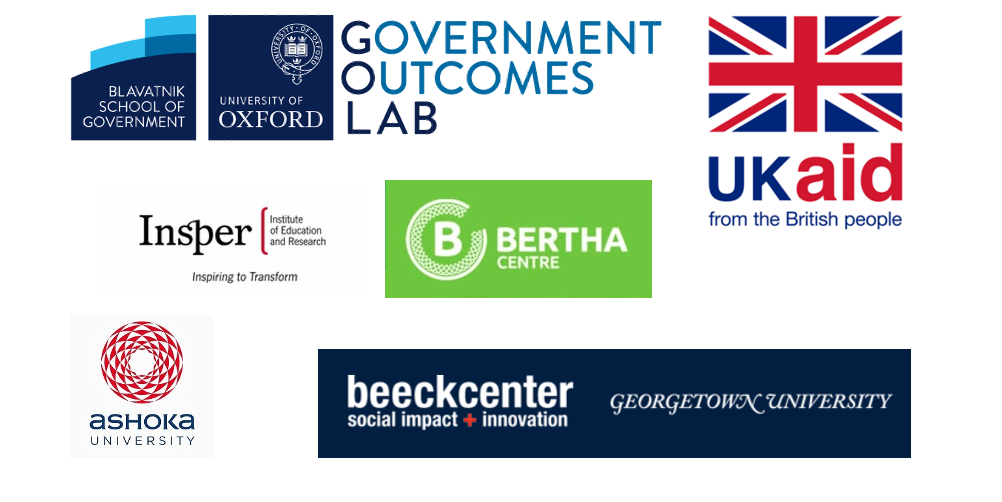Hack and Learn Spring 2021
Set my timezone
Select a timezone from the map or dropdown and click the Set timezone button to adjust the event date/times to your current timezone.

For our bi-annual Hack and Learn event, we brought policymakers, data analysts and other leading representatives of the public and private sectors together to tackle pressing questions in the field of social outcomes.
INDIGO
The International Network for Data on Impact and Government Outcomes (INDIGO) is an emerging data collaborative interested in sharing data about the design, implementation and evaluation of outcome-based projects. INDIGO’s ambition is to support the creation and use of quality data by policymakers, NGOs, citizen advocates and anyone who is addressing or is interested in complex social problems. Learn more about INDIGO here.
INDIGO is a part of the Government Outcomes Lab at the Blavatnik School of Government, University of Oxford. The Government Outcomes Lab represents a ground-breaking example of research-to-practice innovation. Our work demonstrates the power of an academic institution walking shoulder to shoulder with governments and related organisations to enhance policy and practice towards better outcomes for people. Learn more about the GO Lab and the Blavatnik School of Government.
Session Overview
For our bi-annual Hack and Learn event, we brought policymakers, data analysts and other leading representatives of the public and private sectors together to tackle pressing questions in the field of social outcomes. Harnessing skills and experiences from a diverse pool of actors, we provided a space for learning and community building around the use of data in the field and an opportunity to solve problems, co-produce and make better sense of the use of data.
The March 2021 Hack-and-Learn was co-hosted by Georgetown University’s Beeck Center for Social Impact + Innovation, INSPER, University of Cape Town’s Bertha Centre and Ashoka University’s Centre for Social Impact & Philanthropy. The event was sponsored by our partners at UK Government’s Foreign, Commonwealth & Development Office. Learn more about FCDO here.
A hackathon has been described as an “event where developers, designers, and strategists work in teams to solve problems with software and/or hardware and demo the resulting work at the end of the day” (Open Data Project - CIO Council, US Government, 2019).
Inspired by the data visualisations developed during our last Hack and Learn, we integrated most of the outputs to our website. The network diagram is now part of INDIGO main page.
Hack and Learn kick-off sessions
Listen to the audio recording of the session.
Listen to the audio recording of the session.
Hack and Learn Show and Tell session
Listen to the audio recording of the session.
Hack and Learn March 2021
Participants learnt about the basic elements of outcome-based contracts, the pressing issues and challenges within the field, and were introduced to our new database and definitions. Policymakers, NGO representatives, citizen advocates and researchers, were invited to join a group of fellow counterparts in the sector to debate the pressing concerns social outcomes contracts should strive to solve as well as potential ways to solve them. Coders and data analysts joined a team of fellow coders from around the globe, use open-source tools, such as Gephi or Plotly, and open data to explore one of our challenge areas:
- Aligning Outcomes to Sustainable Development Goals. This team aimed to investigate whether investors and other stakeholders might engage in impact investing as they perceive synergies with outcomes-based contract (OBC) goals and sustainable development goals (SDGs). This challenge addressed the OBCs-SDGs alignment and further investigated the interplay with stakeholders' motivations (INSPER & GO Lab).
- Improving Data Visualisations for development focused IBs: Eg. Network map and orgs. (Go Lab, ODSC & Plump).
- User Voice. This team aimed to develop a common understanding/definition of user voice engagement across impact bonds. The group also sought to identify what user voice data is currently being collected across impact bonds. (GO Lab)
- Governments Awarding Outcomes Contracts. This team found, analysed, and shared insights from public procurement documents and contracts related to impact bonds. This team utilised the Open Contracting Data Standard (ODSC) and improved the INDIGO Impact Bond Dataset. They also sought to improve transparency and reduce the transaction costs in contracting for new impact bonds.
- Puzzles for Measuring Girls Education Outcomes. This team aimed to identify innovative assessment strategies for Girls Education projects. These assessment strategies considered that outcomes of interest for Girls Education could be observable only in the long-run. Projects were to be relevant to the targeted audiences, but also viable, accountable and measurable. INSPER to lead.
- Exploring Vaccination Data in the United States. This team explored the U.S. Census Bureau's most recent Household Pulse Survey in conjunction with recent vaccination data made available by the CDC, to help American policymakers better understand or visualise the relationship between vaccination rate and issue areas like access to health services. (Beeck Center).
- A new tool for social impact. This team had access to a new GO Lab tool within the INDIGO framework. The group evaluated the process used to help connect impact practitioners with relevant evaluation resources. (GO Lab)
- Standardising the Indian NGO ecosystem service provider database. This team worked collaboratively to standardise i.e. bring uniformity in the Nonprofit Ecosystem Service Providers Database collated by CSIP. Those interested in quantitative research and databases were encouraged to take on this challenge.
- Visualising Foreign Philanthropy Inflows to India. This team worked to visualise the data on foreign philanthropy (collated by CSIP) in an intuitive manner either using just the foreign philanthropy dataset or in relation to any other publicly available dataset. Graphic design enthusiasts were welcome.
An Impact Bond Pipeline / Nursery. This team thought about at the potential use cases, data model, and process behind a pipeline of impact bonds. They think about the maturity of projects for an onramp and how projects leave the pipeline, conscious that some projects grow into things other than impact bonds.
Participants collaborated with your team members and completed a shared team journal to document their learning. On 25 March, each team presented their prototype products and/or what they learnt during the Hack-and-Learn. After the session, the team joined us for a more relaxed online social. On 22 April, participants will meet with peers online to discuss our Technical & Learning Report about the Hack-and-Learn and define next steps help to shape INDIGO.
What GO Lab will do
We provided a structured dataset on impact bonds (V2), data definitions, and open-source code for the database and visualisations on the GO Lab website and INDIGO account on GitHub. From 11 March to 25 March, we supported a Slack implementation and provided technical support office hours. We hosted an online Show and Tell session on 25 March followed by an online social. With our partners, we will collate the lessons learned into an INDIGO Hack-and-Learn 2021 Technical and Learning Report.
What we will co-produce
Outcomes from the Hack-and-Learn will include open-source visualisations of impact bonds to be published on the GO Lab website and the INDIGO GitHub account. We will co-produce the INDIGO Hack-and-Learn 2021 Technical and Learning Report on how to access, makes sense of and use data on organisations, outcomes, public procurement, and social investment in impact bonds and other types of cross sector partnerships.
Why?
The International Network for Data on Impact and Government Outcomes (INDIGO) is a community of peers with an interest in sharing data about the design, implementation and evaluation of cross-sector collaborations to address complex social problems. We are interested in fostering a culture of transparency, learning, and capacity development across public, private, and third sectors. In addition to publishing open data and open-source code, we want to explore and highlight opportunities to join-up various open data standards initiatives. (We are collaborating and borrowing wheels -- not reinventing the wheels.)
Join the community
- INDIGO holds Quarterly Peer Learning Sessions. The next will be in April. Learn more here.
- INDIGO also hosts bi-yearly Hack-and-Learns. Learn about our first Hack-and-Learn here.
- Email indigo@bsg.ox.ac.uk to join our mailing list.
Interested? Have Feedback?
We will provide updates, including a call for participants via the INDIGO email list along with our partners. We are also open to comments and suggestions on the above session sequencing and agendas. To join the email list or provide feedback, please email indigo@bsg.ox.ac.uk.
